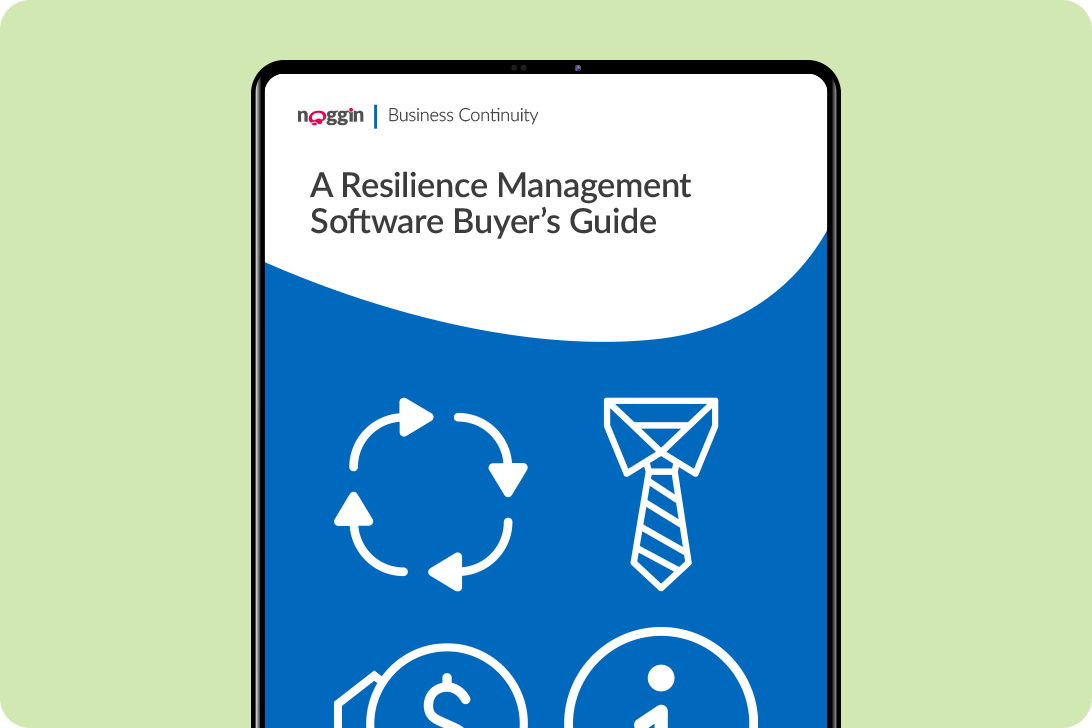Organizations today face a litany of challenges to resilience, with the popularity of the hybrid workforce fragmenting incident response, as well. What can be done to bet...
Request a Demo
Fill in the form below and we will contact you shortly to organised your personalised demonstration of the Noggin platform.
Meet Noggin
An integrated resilience workspace that seamlessly integrates 10 core solutions into one, easy-to-use software platform.
The Noggin Platform
The world's leading integrated resilience workspace for risk and business continuity management, operational resilience, incident & crisis management, and security & safety operations.
Industries
Explore Noggin's integrated resilience software, purpose-built for any industry.
The Noggin Blog
- Home
- work safety
work safety
Latest Articles
Digital Technology to Accelerate Incident Response
Execution speed, i.e., how fast resources, people, and processes are mobilized, has always been integral in incident response and management. A...
How to Conduct a Job Safety Analysis
A key principle in safety management is that most risks should be mitigated as early as possible. However, there’s likely always to be some residual...
What Is Business Continuity Risk?
Business continuity management (BCM), as defined in international standard ISO 22301, is the holistic management process that identifies potential...
What Is BCDR? Business Continuity and Disaster Recovery
As threats to business increase, business continuity and disaster recovery (BCDR) have emerged as critical aspects of business planning and business...
4 Capabilities to Consider in Selecting Crisis Management Software
Organizations today face a unique threat environment, which is forcing them to prioritize organizational resilience. However, many aren’t certain...
What Is Enterprise Risk Management?
Successfully managing risk is key to running a modern business. However, the traditional way in which many businesses have been managing their risk...
Key Steps to Manage Operational Risk
From geopolitical conflict to supply-chain disruption to extreme weather, the risk forecast for companies has dimmed appreciably. However, increasing...
4 Digital Capabilities to Consider in Business Continuity Planning Software
Companies confronting an unprecedented era of compounding, consecutive, and concurrent crises.
The question then turns to, what business continuity...
Mandatory Cyberattack Reporting: A Harbinger of the Future?
As cyberattacks increase will regulators demand mandatory cyberattack reporting?
In one sector, they likely will.
Which one? Read on to find out.
What is Crisis Communication? Crisis Communication Strategies
When crisis response goes awry, poor communication is often at fault. Poor communication typically takes any of the following forms:
- Withholding...
5 Reasons to Upgrade Your Emergency Management Platform
Organizations today face a litany of challenges to resilience, with the popularity of the hybrid workforce fragmenting incident response, as well....
How to Conduct a Job Safety Analysis
A key principle in safety management is that most risks should be mitigated as early as possible. However, there’s likely always to be some residual...
6 Types of Workplace Hazards
Workplace injuries and illnesses don’t come out of the blue. They’re often the product of workplace hazards that haven’t been successfully...
5 Essential Features of Work Safety Management Software
Safety teams are responsible for managing safety risk and assuring the effectiveness of controls. The technological element that helps is safety...
Workplace Guidance for the Wellbeing Crisis
The pandemic had a catalyzing effect on the mental health crisis, with a report in JAMA Health Forum noting that 38% more people are in mental...
4 Reasons to Digitize Safety Management in 2024
A new year means new resolutions. And if you’re leading a safety team, one of yours should be digitization.
Why’s that? Well, a Track Via survey...
The Global State of Workplace Safety
As 2023 comes to an end, it’s instructive to ask, are global workplaces getting safer?
The data, here, is mixed. Nearly three million workers...
How to Manage Worker Wellbeing During a Crisis
Nowadays, wellbeing in the workplace has become synonymous with the mental health crisis. And rightly so, rates of anxiety, depression, and burnout...
What’s Needed to Ensure Psychological Safety in the Workplace
Burnout hasn’t gone anywhere. Future Forum found global burnout rates of 40%, with countries like France and the U.K. reporting rates of nearly 50%....
Digital Technology to Help Implement ISO Standard 45001
ISO 45001 has been around for five years. Quite a lot has happened in that time. Organizations that didn’t make the initial push have all the reason...
Three Challenges to Wellbeing in the Workplace
The pandemic turbocharged the wellbeing and mental health crisis. And so, companies, coming out of COVID, made wellbeing in the workplace...
Eight Unexpected Benefits of Safety Management Software
Covering all comprehensive digital solutions designed to assist businesses with managing and optimizing their safety protocols, safety management...
Five Contractor Management Best Practices
Contractor management goes wrong without established protocols
Contractor management is tough, with high potential for safety incidents occurring...




